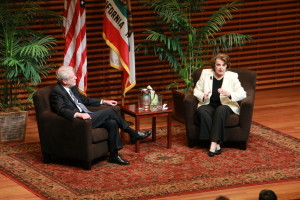U.S. Senator Dianne Feinstein ’55 spoke on May 28 at CEMEX Auditorium about American surveillance laws and national security. The talk was sponsored by six Stanford organizations, including the Hoover Institution, Freeman Spogli Institute and Stanford in Government.

In the talk, moderated by consulting professor Philip Taubman, Feinstein discussed her defense of the country’s national security laws, as well as her criticism of former National Security Agency (NSA) contractor Edward Snowden. In addition to her position as Senator, Feinstein was the mayor of San Francisco during the 1970s and 1980s, and currently serves as the chairwoman of the Senate Intelligence Committee.
Feinstein will be flying to Washington D.C. over the weekend, where the Senate will discuss extending the NSA’s metadata collection program. Section 215 of the Patriot Act, which outlines the metadata collection program, is set to expire at midnight on Sunday.
“It is often depicted as a surveillance program. In my view it is not. In my view, surveillance is observation over a period of time up close and personal. That’s not what this is,” said Feinstein with regards to the NSA’s perceived surveillance programs. Rather, Feinstein insists the programs only query data when there is a “reasonable, articulable suspicion” surrounding a phone call from a known terrorist.
Though Feinstein feels a program such as that outlined in Section 215 is necessary, she would rather telecom companies hold the data until a warrant for any data is obtained, and then hand the information over to the NSA. Current reform efforts of the program are taking the approach under consideration.
Feinstein also took time to discuss her perception of current terrorist threats, including ISIS, recounting the crimes ISIS has carried out in the recent past.
“I don’t think during my lifetime I’ve ever seen the degree to which evil exists out in the world today,” she said. “They are in my view the personification of evil.”
When asked about Snowden, Feinstein did not hesitate to share her criticism of his actions.
“I think it’s a very serious crime,” said Feinstein, discussing the release of sensitive military data. “I don’t respect him for what he did. I believe he should come back to the United States and take his punishment, candidly.”
In addition to her discussion of recent NSA programs embroiled in controversy, Feinstein spoke about her involvement with the report on the Central Intelligence Agency’s interrogation techniques following the terrorist attacks on Sept. 11, 2001. Feinstein has pushed for the report to be made available to the public in its entirety.
Contact Sam Premutico at samprem ‘at’ stanford.edu.
